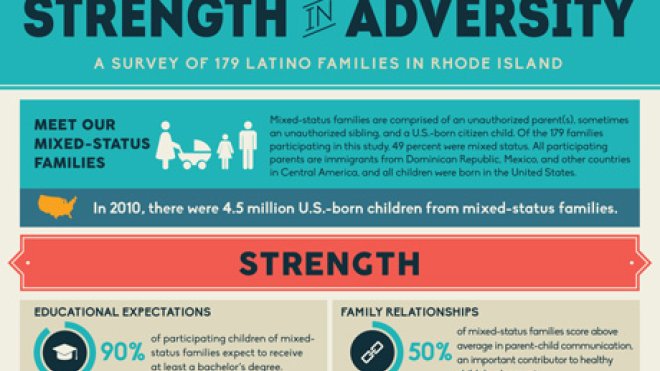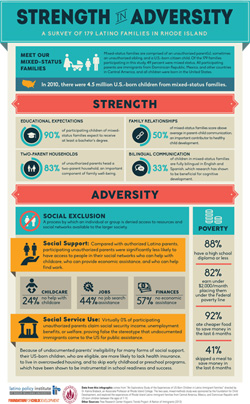For Mixed-Status Latino Families, Family-Based Strengths Counter Major Challenges
Data presented by Latino Policy Institute at RWU and Rhode Island College professor spotlight mixed-immigration-status families in Rhode Island

 PROVIDENCE, R.I. – Facing poverty and discrimination to a scarcity of jobs, food and childcare assistance, mixed-immigration-status Latino families in Rhode Island encounter major challenges – yet in the face of that adversity, they build strong family relationships, hold high educational expectations and benefit from bilingual communication skills of children in those households.
PROVIDENCE, R.I. – Facing poverty and discrimination to a scarcity of jobs, food and childcare assistance, mixed-immigration-status Latino families in Rhode Island encounter major challenges – yet in the face of that adversity, they build strong family relationships, hold high educational expectations and benefit from bilingual communication skills of children in those households.
That’s according to an infographic titled “Strength in Adversity: A Study of 179 Latino Families in Rhode Island,” released today by the Latino Policy Institute at Roger Williams University during an event at the Rhode Island Foundation co-moderated by LPI Director Anna Cano Morales and Elizabeth Burke Bryant of Rhode Island Kids Count.
The discussion featured Kalina Brabeck – an associate professor and chair of the Counseling, Educational Leadership and School Psychology Department at Rhode Island College – who led the research study that generated the data released in today’s infographic.
“These findings shine a spotlight on a hidden population – real Rhode Island families facing major obstacles to fulfilling their potential,” Morales says. “Yet children from mixed-status homes are bilingual, bicultural and have great rapport within their families. Most live in two-parent homes and set high aspirations for education and future careers. What more could teachers and principals across the state hope to have among their student body?”
Brabeck’s two-year, mixed-methods study focused on the experiences of Rhode Island immigrant families from Dominican Republic, Mexico and Central America with U.S.-born children between the ages of 7 and 10. Of the 179 families participating, 49 percent were mixed-status – comprising unauthorized parent(s), sometimes an unauthorized sibling, and a U.S.-born citizen child.
“A large percentage of unauthorized adults in this country are the parents of U.S. citizens,” Brabeck says. “Their children are our future workers, voters and community members. Children and parents do not exist as isolated entities. They are better understood as a system –what affects one, affects the other. The data here confirm that despite the remarkable family-based strengths evidenced by these participating families, the challenges faced by parents have implications for their lives and the life chances of their children.”
The Migration Policy Institute estimates that approximately 11 million unauthorized individuals live in the United States; and according to the Pew Hispanic Center, in 2010, there were 4.5 million U.S.-born children from mixed-status families.
Rhode Island’s population includes approximately 32,000 unauthorized individuals, and approximately 8,000 of these individuals are parents to U.S.-born children living in mixed-status families. Brabeck’s research highlights a number of interesting findings in Rhode Island, many of which are consistent with the broader U.S. population of mixed-status families. Among the key strengths identified for mixed-status families in the Rhode Island study:
- 90 percent of children from mixed-status families expect to earn at least a bachelor’s degree;
- 83 percent of children from mixed-status families grow up in a two-parent household;
- 50 percent of mixed-status families score above average in parent-child communication;
- and 33 percent of children from these families are fully bilingual in English and Spanish.
Yet compared with authorized Latino parents, participating unauthorized parents in the study were significantly less likely to have access to people in their social networks who can help with childcare, provide economic assistance and help them find work. Other challenges include:
- 88 percent of unauthorized adults in the study have a high school diploma or less;
- 82 percent earn below $2,000 per month, placing them under the federal poverty line;
- 92 percent ate less-expensive food to save money in the last six months;
- and 41 percent skipped a meal to save money in the last six months.
Less than two percent of the participating unauthorized parents claim social security income, unemployment benefits or welfare, which counters the stereotype that undocumented immigrants come to the U.S. for public assistance.
Part of the mission of the Latino Policy Institute at Roger Williams University is to generate and communicate non-partisan data on Latinos in Rhode Island, to stimulate public policy discussions and ensure that leaders across the state are equipped with the evidence to inform decisions, rather than anecdotes alone. In teaming with the Latino Policy Institute to release her findings, Brabeck becomes the first LPI Research Fellow. Morales says her hope is to take advantage of the academic talent at Rhode Island’s colleges and universities to partner on research relevant to issues affecting Latino communities.
Brabeck’s research – titled An Exploratory Study of the Experiences of U.S.-Born Children in Latino Immigrant Families – was funded by the Foundation for Child Development and will be published in full at a later date.